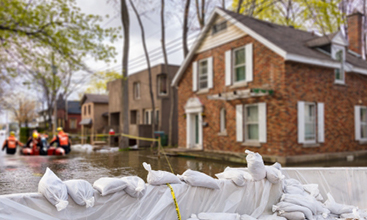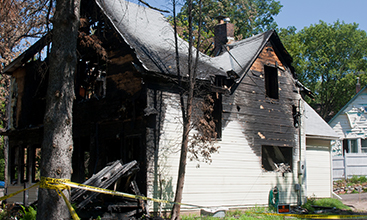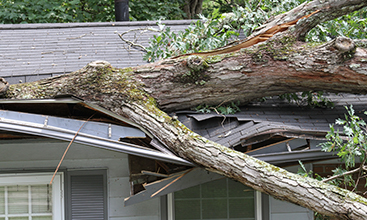
Wading into Home Insurance Water Damage Coverage: What You Need to Know
Water damage is one of the most common causes of home insurance claims. From burst pipes and leaking roofs to natural disasters and flooding, water can wreak havoc on a property and its contents. That’s where home insurance water damage coverage comes in. It’s an essential safeguard that protects homeowners from financial losses due to water damage. However, not all water damage is covered by insurance policies, and the nuances of coverage can be confusing. In this blog, we’ll dive into the waters of home insurance water damage coverage and provide you with everything you need to know. So, let’s dive deep into the complex world of home insurance water damage coverage and ensure that you are adequately protected against any water-related mishaps that may occur.
Overview of Home Insurance Water Damage Coverage
Home insurance water damage coverage is a crucial aspect of protecting your home and your belongings. Water damage can be caused by a variety of things, including plumbing issues, natural disasters, and accidents. Having adequate insurance coverage can provide peace of mind in the event that you experience water damage in your home. It is important to understand what your home insurance policy covers and what it doesn’t cover in terms of water damage.
Most home insurance policies cover water damage caused by sudden and accidental events like burst pipes or an appliance malfunction. However, damage caused by floods or other natural disasters typically requires separate flood insurance. Additionally, it is important to have adequate coverage for damage to personal belongings, as some insurance policies may have lower limits for these items.
To ensure that you have the right coverage for water damage, it is important to review your policy regularly and update it if necessary. You should also take preventative steps to avoid water damage, such as regular maintenance and inspections of your plumbing and appliances. By understanding your coverage and taking preventative measures, you can protect your home and your belongings from the potential damage and costs associated with water damage.

Water Damage Insurance Claim
Different Types of Water Damage Covered by Home Insurance
As mentioned, not all types of water damage are covered by home insurance. It’s essential to understand the different categories of water damage and how they may or may not be covered by your policy. The following are some common types of water damage that could potentially be covered by home insurance:
- Sudden and accidental discharge: This includes things like burst pipes, leaking appliances, and overflowing toilets.
- Rain or snowstorm damage: Your policy may cover water damage caused by heavy rain or snowstorms, but it’s important to review your policy for specific coverage limitations.
- Fire extinguishing damage: If water is used to put out a fire in your home, the resulting water damage may be covered by your insurance.
- Roof leaks: In some cases, home insurance may cover damage caused by a leaking roof, but it’s important to review your policy for any limitations or exclusions.
It’s essential to note that flooding is usually not covered by home insurance. Flood damage refers to water that comes from sources outside of the home, such as overflowing rivers or heavy rainfall. To protect against flood damage, you will need to purchase separate flood insurance.
What Can You Do to Protect Your Home from Water Damage
Water damage is one of the most common and costly problems that homeowners face. It can wreak havoc on your property, damage your belongings, and even cause structural damage to your home. Fortunately, there are several things you can do to protect your home from water damage and avoid costly repairs.
The first step in protecting your home from water damage is to make sure that your gutters and downspouts are working properly. Clean your gutters at least twice a year to prevent clogs and blockages.
Downspouts should also be extended far enough from your home’s foundation to prevent water from seeping into your basement or crawlspace. Another effective way to protect your home is to install a sump pump. This device is designed to prevent water from flooding your basement or crawlspace during heavy rains or melting snow.
Another way to keep water out of your home is to make sure that your doors and windows are properly sealed. This means checking for gaps or cracks around the frames and replacing any damaged or worn weather stripping.
In addition, consider installing a backup generator that can keep your sump pump running in the event of a power outage. Investing in a waterproofing system is also a smart move, as it can help prevent damage to your foundation and basement walls.
By taking these steps and staying vigilant, you can protect your home from water damage and enjoy greater peace of mind. Remember that prevention is key, so don’t wait until you have a problem to start taking action. With a little effort, you can keep your home dry and safe for years to come.
How to File a Claim for Home Insurance Water Damage Coverage
If you do experience water damage in your home, it’s essential to file a claim with your insurance company as soon as possible. The following are some steps to take when filing a claim for home insurance water damage coverage:
- Document the damage: Take photos or videos of the affected areas and any damaged belongings before beginning cleanup or repairs.
- Contact your insurance company: Let them know about the water damage and provide any necessary documentation or evidence.
- Mitigate further damage: Take steps to prevent further damage, such as removing excess water and drying out affected areas
- Get repair estimates: Obtain multiple estimates from licensed contractors for the cost of repairs.
- Keep track of expenses: Keep a record of any expenses related to the water damage, such as hotel stays or rental equipment.
- Follow up with your insurance company: Stay in communication with your insurance company throughout the claims process and provide any additional information they may request.
By following these steps and staying organized, you can increase the chances of a successful claim and receive the coverage you need for water damage to your home.
The Cost of Home Insurance Water Damage Coverage
Home insurance is an essential consideration for any homeowner. When investing in a home insurance policy, it is imperative to factor in water damage coverage. Water damage may occur from a variety of sources, including leaks, floods, rain, and faulty plumbing. These damages may lead to mold and structural damages, causing costly repairs that may weigh negatively on your financial status.
The cost of home insurance regarding water damage coverage varies depending on several factors, including the location of the property, its age, and the coverage amount. Properties located in high-risk flood zones have a higher premium compared to those in low-risk areas. Homes with older plumbing systems and roofing also attract higher premiums as they are more prone to water damage. Nonetheless, the cost of water damage coverage is negligible compared to the cost of water damage repairs.
Home insurance policies that cover water damage are vital for protecting your property and financial security. Without water damage coverage, you may be vulnerable to costly repairs that may leave you financially strained. As a homeowner, weigh the cost of water damage coverage against the possibility of incurring substantial repair costs after a water damage incident. Always consult with your insurance provider to identify affordable coverage policies that suit your property’s needs and budget.

Flood Damage Claim
Tips for Navigating the Waters of Home Insurance Water Damage Coverage
Navigating the waters of home insurance water damage coverage can be confusing and overwhelming. To ensure you have the right coverage for your needs, here are some tips to keep in mind:
- Understand your policy: It’s crucial to know what is covered and what is not covered under your home insurance policy regarding water damage.
- Keep up with maintenance: Regularly maintaining your home’s plumbing, roofing, and gutters can help prevent water damage and keep your insurance premiums lower.
- Review your coverage regularly: As your home ages or if you make any updates or renovations, be sure to review your coverage to ensure it is adequate for your needs.
- Consider additional coverage: Depending on where you live, you may need additional flood insurance or backup sewer coverage to fully protect your home from water damage.
- Communicate with your insurance provider: If you have any questions or concerns about your coverage, don’t hesitate to speak with your insurance provider. They can help guide you in making the best decisions for your home and budget.
By following these tips and staying informed, you can navigate the waters of home insurance water damage coverage with confidence and ensure your home is protected from potential water damage.
In conclusion, water damage can be a costly and stressful issue for homeowners. However, by taking preventative measures such as maintaining your home and investing in proper insurance coverage, you can protect yourself from financial strain and ensure the safety of your property. If you do experience water damage, remember to document the damage and file a claim with your insurance company promptly. By following these steps and staying informed, you can navigate the waters of home insurance water damage coverage with ease. So, always stay prepared and informed to keep your home safe from water damage.
https://www.google.com/maps?cid=11943182435691765299





